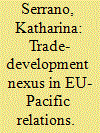| Srl | Item |
| 1 |
ID:
102754


|
|
|
|
|
| Publication |
2011.
|
| Summary/Abstract |
At first glimpse, the Communauté Financière Africaine (CFA) could be seen as an extraordinary example of the kind of economic and political leadership developed nations could establish in Africa. Dig deeper and the relationship France keeps with her former colonies shows evidence of chronic and endemic problems. By concentrating on the economic and geo-political gains the CFA has brought for the countries involved, this paper offers a pertinent evaluation of the nature, purpose and relevance of such Community, in light of two antagonistic theories of international relations: Pluralistic Security Communities and Dependency Theory.
|
|
|
|
|
|
|
|
|
|
|
|
|
|
|
|
| 2 |
ID:
101833


|
|
|
|
|
| Publication |
2011.
|
| Summary/Abstract |
For almost 40 years, relations between the European Union and African, Caribbean and Pacific (ACP) countries centred on trade and development policy. The partnership survived various challenges and evolved into an institutionalised model for North-South relations. In reaction to internal and external forces of change, in the Cotonou Agreement (2000) the EU introduced to its relations with the developing world a new trade-development paradigm to be implemented via Economic Partnership Agreements. The latter are intended to be innovative foreign policy instruments, functioning as development tools and trade liberalisation mechanisms. Against the background of current internal restructuring of EU foreign policy and an increasingly politicised development agenda, this article undertakes an enquiry into the nature of the trade-development nexus in EU-Pacific Island countries (PICs) relations. The analysis is based on a theoretical framework which employs assumptions and findings related to IR theory, referring in particular to realism and dependency theory. A critical examination of EU policies shaping the trade-development nexus reveals that it is a rather flexible foreign policy tool, equipped with an auto-adjustment mechanism to ensure the balance of EU trade and development objectives. From PICs' perspective, its predictability and therefore developmental value, may, however, be diminished.
|
|
|
|
|
|
|
|
|
|
|
|
|
|
|
|